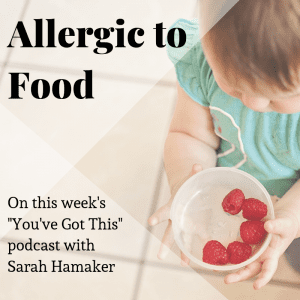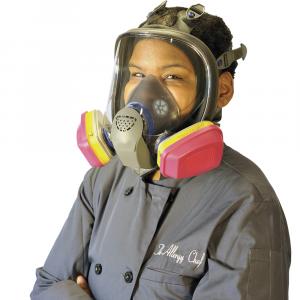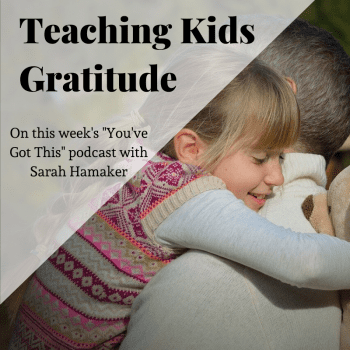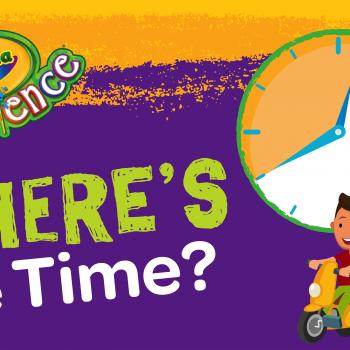
The following is an excerpt from my interview with Kathlena The Allergy Chef on my podcast, “You’ve Got This.”
Kathlena The Allergy Chef has more than 200 food allergies and intolerances. Several of her allergies are life-threatening. She has a handful of safe foods to eat, and one source of safe water. Additionally, most of the members of her household also have food allergies and special diets, none of them the same. After being given 30 days to live, she made it her mission to help the food allergy and special diet communities thrive. Although she can’t eat the food, she helps people find safe and delicious options. Three years from her lowest point, she and her team have published several cookbooks, started a bakery, done local and nationwide outreach, developed hundreds of free recipes and resources, and much more. Learn about all of their ventures at TheAllergyChef.com.
Is it me or do we feel like there is a lot more food allergies these days? Are we just hearing about it more? Do you feel like there are more people with food allergies these days?
Kathlena: It’s actually both. Awareness is on the rise mainly because in a lot of cases, you are dealing with life or death situations and if no one knows what to do or how to handle the situation, then it’s really tough to be a person with food allergies. But allergies are on the rise in both children and adults. Now, back in 1997, the rate of food allergies especially in children more than doubled and it has been a real issue ever since. There’s a lot of working theories on what’s going on. You got food quality, you’ve got GMOs, pesticides, growing conditions, you’ve got germ theory, autoimmune conditions. The problem is no two people are the same, so one person got allergies one way, another person was just born with them, another person might have a leaky gut and developed them. But science and medicine, unfortunately, at times has a tendency to treat as all the same but we are not the same and we don’t know enough collectively about food allergies.
In my kids’ elementary school, they have nut-free, peanut-free tables that are labeled for kids who need to be careful about foods. None of my kids have life-threatening food allergies, and I’m grateful for that because I know that can be really tough to live with. But it’s nice to see that society seems like they are taking food allergies more seriously these days.
Kathlena: People are definitely taking food allergies more seriously, especially when you have celebrities that have been diagnosed or have allergic reactions. There are a lot of companies working hard behind the scenes as well to help provide safe foods. The amount of pioneering happening in the field right now is mainly because their kid has a food allergy.
I think it can be very encouraging as well for those who live with food allergies. I find that it really is not as hard as you think it is to make those accommodations, to be willing and able to want to serve those who need you to pay attention to what you are going to bring them to eat.
Kathlena: On a small scale, it’s definitely easier, especially because we live in a disposable age, like you can go to the store and buying a disposable pan and buy some safe product to put together a pretty safe option for them. On a commercial scale, however, that’s where things get tough. There’s never been this many options, and yet at the same time, it’s got to be made for us by us to avoid cross-contamination. You cannot reasonably expect restaurants to know how to safely serve around every food allergy. We are the 1%. In the restaurant industry, the turnover rate is high, which means it’s really difficult to educate their staff. All it takes is that one mistake, and you have the next company on the 6 o’clock news. Nobody wants that. I
On both sides, it’s almost as if we focus more on what we can’t do it instead of maybe focusing on what we can do.
Kathlena: You have pegged our mission as a company, as a family. The moment people realize they have a food allergy or allergies, they fixate on everything they can’t have. It’s happened to one of our kids. When he was about six years old, we learned that he was also allergic to wheat (among other allergies). He asked me: “What about pancakes?” No. “Cake?” No. “Pizza?” Nope. “Bread?” No, you can’t have any of that. “Spaghetti?” No, you can’t have that. He went down the list and he sat there and cried in that moment. I went out that same night and found every safe option for him. We have brought it all home and we set it up in the kitchen for him to see in the morning.
As food allergy parents, you accept it or you rise to the occasion and say, “I’m going to find everything that this child can eat.” It’s the latter parent that’s creating the companies and making the world a better place. Not that the other parents aren’t good parents – they are, I promise you. They are just more afraid and want to make sure that their child stays safe. For me, I was that determined parent. I focused on what can he have, what can I invent, what can I reinvent, what’s the limitations, and what are not limitations? Everyone has their own sets of talents and gifts, and we all use them differently, but at the end of the day, we’re all trying to make the world a little bit better and a little bit easier for these kids.
 I’ve noticed that even those of us without food allergies in our home, we are touched by this all the time. Either it’s a relative who can’t eat shellfish or it’s a friend from church who can’t have peanuts, we all want to make the world easier for everyone.
I’ve noticed that even those of us without food allergies in our home, we are touched by this all the time. Either it’s a relative who can’t eat shellfish or it’s a friend from church who can’t have peanuts, we all want to make the world easier for everyone.
Kathlena: You are absolutely right. We have a saying that we enjoy and exclude the food, not the child. Inclusion with children is really critical because for social and mental and emotional health. They need to be like they are part of something. One resource I recommend is snacksafely.com. The top eight allergens are wheat, dairy, egg, soy, peanut, tree nuts, fish, and shellfish, and here in the United States, that also includes coconut under tree nuts. Including people with food allergies can be overwhelming sometimes and yet at the same time, it is one of the most amazing gifts you can ever give a food allergy family.
To hear more great advice and stories from Kathlena, listen to “Allergic to Food” on the “You’ve Got This” podcast.












